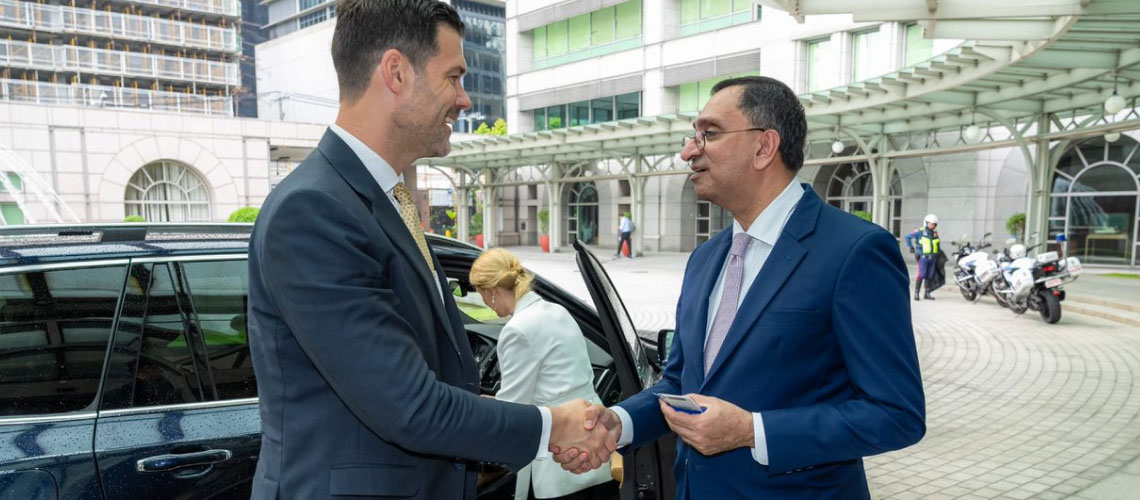
Published
- Sustainability
- Financing
Regional development banks crucial in funding climate action
The battle against climate change is won or lost in Asia and the Pacific. New and innovative blended financing schemes involving multiple institutions and greentech from leading suppliers hold the key.
Funding the transition to a fossil-free society requires a pooling of resources from a range of institutions. Multilateral Development Banks (MDB) have a key role to play in attracting and organising blended financing schemes required to crowd in the trillions of dollars needed. Asian Development Bank (ADB) is stepping up its efforts to collaborate with the export finance community, private investors and exporters of cleantech from across the world.
Kjell Forsberg, Deputy Director Business Area Large Corporates at EKN, underlines the need for greater collaboration across different sectors, from commercial banks to development finance institutions and suppliers of technology and solutions needed for the climate transition. “The substantial need for funding requires creative, structured solutions where private capital joins aid, development funds and export credits. A pooling of resources in terms of capital, technology and sustainability expertise is necessary if we are to reach the climate goals.”
Forsberg recently returned from the ADB headquarters in Manila in preparation for a visit by a Swedish delegation headed by the Minister for International Development Cooperation and Foreign Trade, Johan Forssell. The presence of a government minister reflects the ambition of Sweden’s new conservative-liberal government to channel an increasing share of the official development aid through multilateral agencies and the fact that trade plays a key role in the development of growing economies (see fact box). “The economic growth, demographics, infrastructure program and transition to clean energy of the Marcos administration make the Philippines an attractive destination for Swedish investors,” noted Forssell and concluded that, "the Philippines is really a key market for us, so it was important to come here.”
The delegation was received by ADB President Masatsugu Asakawa.
“Sweden has a lot to offer”
André Nilsson, a Director’s Advisor at ADB, believes Sweden has a lot to offer Philippines and the rest of Asia and the Pacific. “Sweden sets an example in how to combine the transition to a fossil-free economy with robust economic growth. Swedish suppliers have a lot to offer in the way of necessary technology and experiences, but its exporters need to be present at the tables where large-scale transition projects are discussed and funded.”
Forsberg underlines that the combination of industrial knowhow and flexible export credit agencies in the Nordic region is a positive force in the transition to a climate-aligned society. “From battery storage, carbon-free steel and power transmission to electric vehicles and oil platform technology, Nordic industry is combining to create a world-leading value chain for the transition. Backed by innovative, competitive financing from world-class export credits systems, Nordic suppliers and exporters are well positioned to facilitate a zero-carbon future.”
And nowhere is a zero-carbon future more pertinent than in Asia and the Pacific. In addition to accounting for more than half of the world’s greenhouse-gas emissions, the region is warming faster than anywhere else and is acutely vulnerable to rising sea levels, extreme weather events, and biodiversity loss. “The climate crisis is worsening daily, prompting many to call for increased climate finance. We are taking action to meet this call by elevating our ambition to USD 100 billion in cumulative climate finance from our own resources by 2030,” says Nilsson at ADB.
Repurposing of fossil plants
To this end, ADB has launched the Energy Transition Mechanism (ETM), a program aimed at helping confront the issue of climate change by reducing greenhouse gas emissions in Asia and the Pacific. More than 50% of the world’s greenhouse gas emissions come from the region, which still relies heavily on coal-powered energy. “ETM aims to use concessional and commercial capital to accelerate the retirement or repurposing of fossil fuel power plants and replace them with clean energy alternatives,” Nilsson explains.
ETM was launched at the G20 meeting in Bali 2022. Another ADB initiative is IF-CAP, a multi-donor financing partnership facility with the goal of scaling-up finance for accelerated action against climate change in the region. Sweden is a founding member of ADB. It has provided USD 480.7 million in capital subscription to ADB as of 31 December 2022. It has also contributed and committed USD 535.66 million to ADB’s special funds since becoming a member in 1966.
The Swedish Government’s view on trade as a path to development
Development assistance can help countries build capacity, but the path from poverty to prosperity requires a well-functioning market economy and active trade. The private sector has a key role to play in creating innovative and sustainable solutions, and productive employment. Being able to earn a living is one of the most important factors in poverty reduction. To increase the returns on development assistance the Government is linking development policy, promotion and trade policy.
